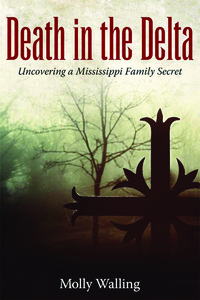

As Molly Walling was growing up in Knoxville and Bristol, there was always a dark cloud hanging over her family. In 2006, several years after the death of her father Jay Fields, she learned that he was implicated in the murder of two black men, Simon Toombs and David Jones, in December 1946 when he was the editor of a newspaper in the small town in the Mississippi Delta where he had grown up.
As adults, many of us become fascinated by family history - frequently because of nostalgia for a vanishing way of life or the desire to write down family genealogy for our children and grandchildren - but in Walling's case she is haunted by the dark secret that had always been hidden in her family's past.
Death in the Delta: Uncovering a Mississippi Family Secret is Walling's personal quest over several years to discover the details of the terrible incident. She starts by interviewing family members-aunts, uncles, cousins and her mother. They all want the past - and its scars and tragedies - to stay buried in the past.
Walling travels to Mississippi to research grand jury records, FBI archives, any government records that might provide clues into the details of the case. She discovers that, after a hearing before an all-white grand jury, her father's case was never brought to trial.
Through interviews with family members of the black victims and eye witnesses she gets more specific details about the case. In contrast to her own family, the black community is very grateful that she is interested in confronting the truth.
The book is a compelling read. I read it in one afternoon and evening, with a dinner break; it was hard to put it down. It is part family memoir, part legal thriller, but its most profound dimension is that it is a portrait of the Deep South in the years just before the Civil Rights era, when white privilege, entitlement and racial bias were still tenaciously clinging on.
The young black men who are murdered were World War II veterans who had returned to their rural Mississippi towns with a very different perspective on the world and the role of black people in American society than they had before the war.
The book has a fascinating structure. It moves chronologically through Walling's investigations, but interspersed are her own Fields family memoirs, stories of life on the Mississippi cotton plantation in the 19th and early 20th centuries and lots of details of Walling's life, her relationship with her parents, and especially her adolescent years growing up in Bristol, Va., in the 1960s.
This is an important book. It dramatizes the corrosive effects of racism on one family, and, by extension, on the South even down to the present day. Its closest literary antecedents are the epic novels by William Faulkner, whom Jay Fields met on several occasions, and the two recent best-selling family memoirs by Jeannette Walls, The Glass Castle and Half Broke Horses.
Walling has the gift of a natural writer. At the heart of the book is a complex portrait of Fields and how dark secrets seemed to have affected his entire life. Poignantly, you also see glimpses of her father's creative writing talents as well, from family letters and editorials from his days as a small-town newspaper editor.
Walling's family is probably very anxious about the book's publication. Walling closes the book with this lament: "I grieve for the loss of Simon and David and for their families who still, 60 years later, mourn the loss of those young men. I grieve for my mother and for my father. If my beloved family and I can bear to look unflinchingly at our history and tell ourselves the truth and if we can allow ourselves to own our past and our human failings, there is hope for forgiveness, even reconciliation."
>> On Sept. 30 Walling will discuss her book at the Washington County Library. Click HERE for more.
About the Author: Molly Fields Walling was born in Anguilla, Miss., and grew up in Knoxville, Tenn., and Bristol, Va. She taught English at Sullins Academy and Virginia Highlands Community College for several years. She moved to Asheville, N.C., in 2001. She has since completed an MFA from Goucher College and has recently been teaching at UNC-Asheville.